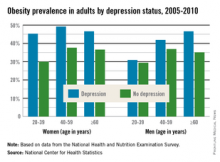Adult women who are depressed are more likely to be obese than women who are not depressed at any age. Depressed adult men over 60 are more likely to be obese than nondepressed men, a recent report from the National Center for Health Statistics shows.
A significant statistical difference was found in obesity rates for all identified age groups of women. For women aged 20-39, 45% of those who were depressed were obese, compared with 30% of nondepressed women. Among women aged 40-59, 49% of depressed women were obese, compared with 38% of nondepressed women, and among women over 60, 47% of depressed women were obese, compared with 37% of nondepressed women.
Among depressed men, only those over 60 had a significant difference in obesity rates, at 47%, compared with 35% of nondepressed men, the NCHS found. Overall, 43% of adults with depression were obese, compared with 33% of adults who were not depressed.
The report cited no statistical differences in obesity rates by ethnicity or race except for non-Hispanic white women. Among that group, 45% of those who were depressed were obese, and 32% of those who were not depressed were obese.
In addition, the NCHS found, adults who were taking antidepressants were more likely to be obese than those who were not taking antidepressants, regardless of the severity or presence of depressive symptoms. The report cited an obesity rate of nearly 55% for adults with moderate to severe depressive symptoms who also were taking antidepressants; that rate was 16% higher than it was for people with similar symptoms but not taking antidepressants, the NCHS reported. People with mild to no depressive symptoms who were taking antidepressants had an obesity rate of 38%. That was 5% higher than it was for those not on antidepressants but with similar symptoms.
It could not be determined whether depression or obesity occurred first, the report said, because “they were both measured at the same time.”
The NCHS study used data collected from the National Health and Nutrition Examination Survey.

